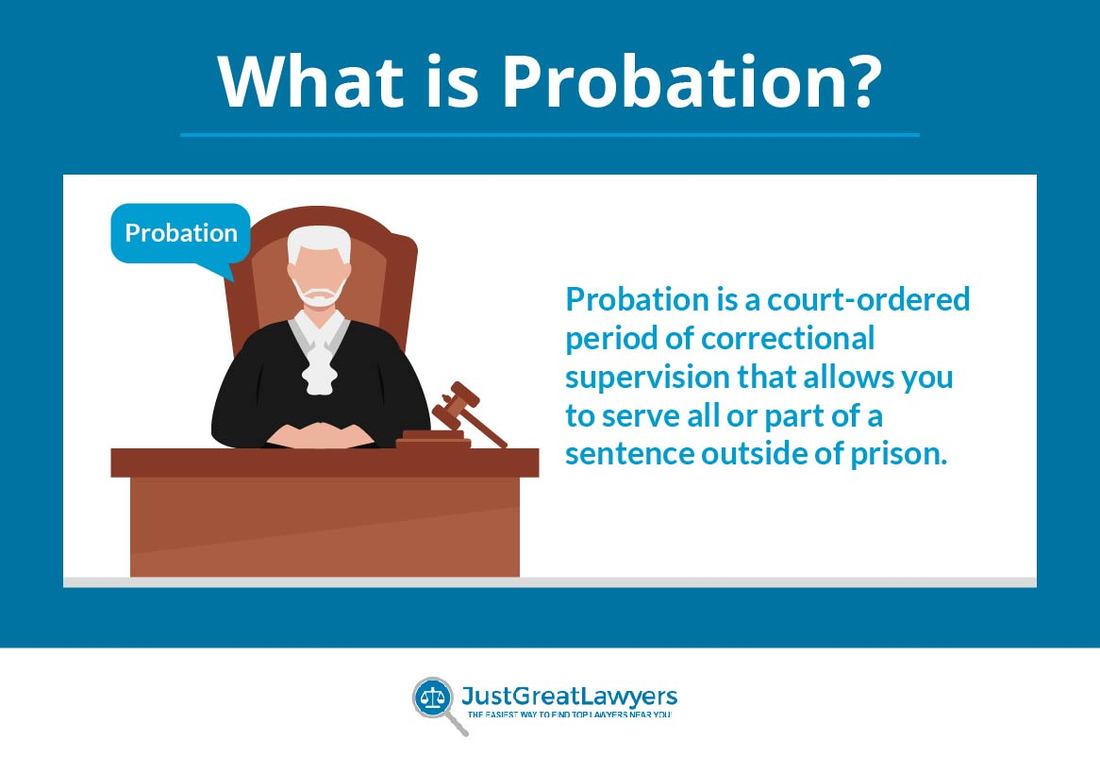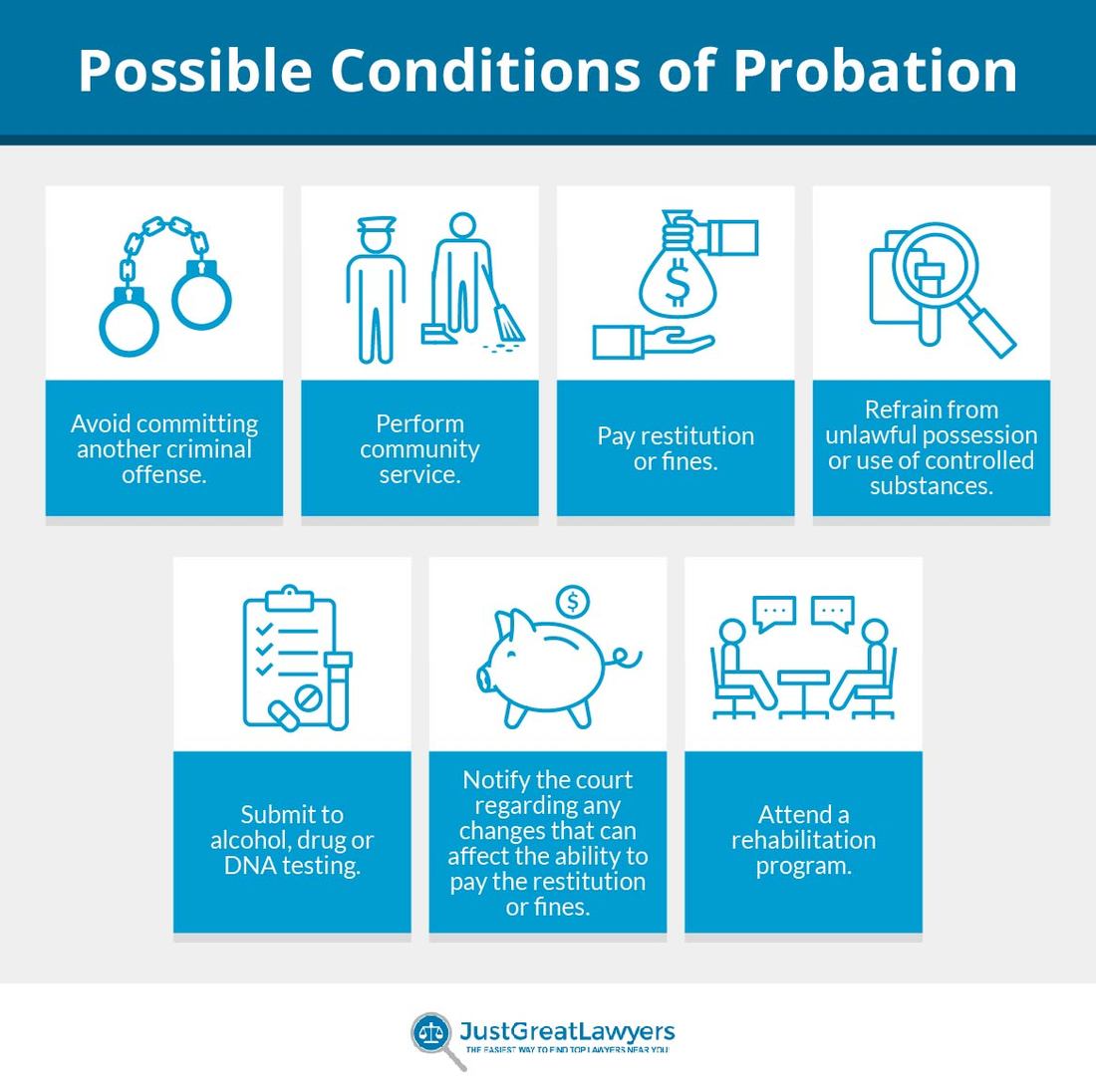
Probation is a court-ordered period of supervision during which a person must follow certain rules and conditions. Governed by criminal law statutes, probation administration occurs on two levels:

Depending on the offense level of the crime, probation typically lasts anywhere from one to five years but may be extended in certain circumstances. Probation laws may vary from state to state, so be sure to check with your probation officer or state or local office to further understand how the process works.
In this post, we discuss how probation works, the types of crimes that may result in probation and common conditions of probation. We also address whether you can get your probation time reduced and what can happen if you don’t follow the terms of your probation.
While the probation process has commonalities across different court systems, the exact laws and procedures depend on whether you were convicted of a federal crime or state crime and which state you were sentenced in.
At a federal level, probation is run by the judicial branch which is assisted by judicial districts nationwide. When the offender is convicted of criminal charges, the judge must decide on a sentencing option for them to serve their time.
You may encounter these two types of probation:
Probation (alternative to a jail sentence): A court-ordered period of supervision where a federal probation officer monitors the offender's actions and ensures they are complying with the conditions of probation ordered by the court
Supervised release: A sentence that is a combination of a specific prison term followed by probationary post-imprisonment supervision
At the state level, probation is run by the executive branch and its use may vary from jurisdiction to jurisdiction. The probation process at the state level works similarly to the federal level, but state and local districts may have their own rules and regulations for when probation is imposed and how it is administered.
You may encounter two main types of probation in the state court system: probation as an alternative to jail or probation added to jail time as part of your sentence. Keep in mind that the regulations and laws may vary for each state or county.
Probation (alternative to a jail sentence): A judge may impose probation as an alternative way for you to serve a sentence outside of prison or jail time. Probation may be supervised by a state probation officer.
Probation (added to jail time as part of their sentencing): A court sentence may include a combination of incarceration and probation. In these cases, a period of probation typically follows a term in prison.
According to a study from the Bureau of Justice, offenders were put on probation for the following misdemeanor and felony crimes:
Felony
Domestic violence
Sex offenses
Drugs
DUI/DWI
Traffic offenses
Misdemeanor
Domestic violence
Sex offenses
Drugs
DUI/DWI
Traffic offenses
Probation may not be permitted for serious crimes, including the following:
Controlled-substance offenses
Felonies in which a firearm is used
Murder
Rape
Manslaughter
Armed robbery
Treason

From curfews to drug treatment programs, state courts may impose conditions for probation, and the federal court may do so under 18 U.S.C. § 3551. Some of these conditions may include ordering those on probation to do the following:
Perform community service
Pay restitution or a fine
Follow a curfew
Submit to drug testing, which may include random drug testing
Submit to DNA testing
Attend rehabilitation programs or other treatment programs
Register as a sex offender
Remain within the jurisdiction of the court
Work at suitable employment
Refrain from unlawful possession or use of controlled substances
Not commit another criminal offense during probation
Not possess a firearm
Keep in mind that the terms of probation may depend on the crime committed, the specific case involved and federal, state or local regulations.
Ultimately, the length of the probationary period depends on the offense level of the crime and the laws and penalties of the jurisdiction. Federal offenses may have different probation terms than individual states and localities.
If probation is allowed by law, the local, state or federal court determines the appropriate term. Local and state terms may vary, but under 18 U.S.C 3561(c), the following terms are authorized on a federal level:
Felony: 1 to 5 years
Misdemeanor: No more than 5 years
Infraction: No more than 1 year
Check court records or with your probation officer to get a more accurate answer for when your probation period ends.
While rules and regulations can vary by each state, violation of probation may result in a court summons or arrest warrant. The court must then conduct a series of hearings to determine whether you committed a probation violation. If so, your probation may be modified or revoked, or you could even receive a jail or prison sentence.
You may be able to reduce your federal probation term by a petition through your attorney or by contacting your probation officer. Check with your probation officer or attorney to see when and how you might petition to reduce your time on probation.
Whether probation time can be reduced on a state or local level depends on your state or locality’s laws and how your local probation regulations work. Contact your probation officer or the appropriate court district to learn about their probation rules.
Most states have broadly written statutes permitting courts to order an early release from probation. Other states have more specific conditions under which a person’s probation can be terminated. In Texas, for example, a judge can end probation early only if the person has satisfactorily completed two years of supervision or one-third of the original supervision period, whichever is less.
If you need more assistance understanding the probation process, reach out to a criminal defense attorney. A local defense lawyer can answer questions specific to your particular case and the criminal justice system in your state.
